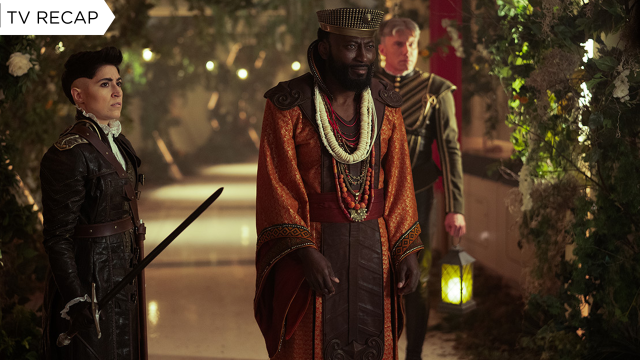Although it has largely treated its characters with great care in its debut season, Star Trek: Strange New World’s general sense of episodic breeziness has also given those characters a light touch — moments of highlights, but nothing too deep with our crewmates. This week’s episode changes that, wrapping up one of its most sincere stories yet in the show’s most zany caper.

Strange New Worlds, for the most part, is a remarkably consistent TV show. This is good, because it’s consistent at being very good, but it also makes the work of a TV recapper… interesting. Every week, I tell you the show has a new premise, every week, I tell you this premise is a riff on archetypes and plots that Star Trek has experimented with for over half a century of storytelling. Every week, I tell you this is very charming, and then, also every week, I tell you that the show layers this charm over some fun character beats and explorations, that we get to learn a little something more about our Starfleet heroes, and then we move on, ready for all that to happen again the week after.
Why I’m opening this week’s recap with an extra layer of metatext? Because episode eight of Strange New Worlds’ debut season, “The Elysian Kingdom,” is kind of about that metatext, in a way. It’s a story where its hero — in this week’s case, Babs Olusamokun’s Dr. M’Benga — knows that he’s in a story, and thinks he knows the ending. The same could be said of me, until both I and Dr. M’Benga alike were given quite the surprise in its climax… but we’ll get to that later, and rewind for now.
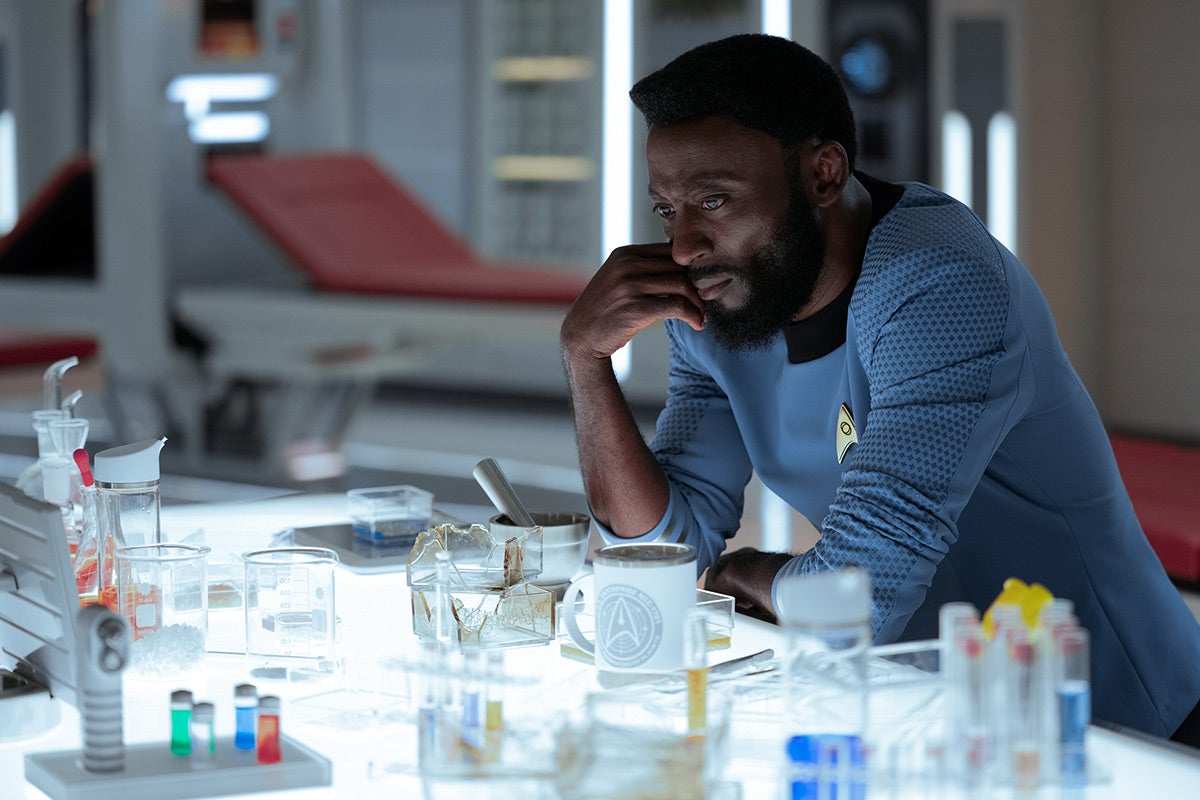
“The Elysian Kingdom” is a riff on Star Trek’s love of a genre-bending fantasy romp. From the likes of “The Squire of Gothos” and “Qpid,” Star Trek loves to thrust its science fictional heroes into a fantasy setting so they can get their farce on, and this week’s episode is no different. After another evening reading to his transporter-hidden terminally ill daughter, Rukiya, Dr. M’Benga, unware the Enterprise is currently exploring a mysterious nebula, finds himself suddenly awake and in a world where the Enterprise is a foliage-strewn magical kingdom, and its crew all suddenly embodying roles from the book he reads to his daughter in her infrequent trips out of the transporter buffer: the titular Elysian King. Cast as the book’s hero, King Ridley, but still aware that he is the Chief Medical Officer of a starship, Dr. M’Benga finds himself having to solve the mystery of what’s befallen the crew, while also navigating a fantasy tale of dashing courtly guards, sycophantic princesses, simpering advisers, evil sorcerers, and a villainous Queen intent on tearing his apparent kingdom apart.
What follows, for the most part then, is an excuse for the cast of Strange New Worlds to have the most ridiculous fun possible and still somehow get away with it as a coherent narrative and performance. “The Elysian Kingdom” cleverly lets M’Benga sidestep the tired science/fantasy sceptic approach, his journey through this tale not predicated on the fact he’s an extremely smart doctor, but the fact he knows the tale of the Elysian Kingdom so well from reading it to Rukiya over and over that he can act as a distant, powerful influence as he tries to get his way around the Enterprise and actually figure out what’s going on. Paired with Chief Engineer Hemmer (Bruce Horak) — who finally gets a little more to do this week — as the only other seemingly unaffected member of the crew to fill in that more typical straight man comedic role, the duo essentially get to navigate the ship and watch everyone else chew the living hell out of the scenery along the way.
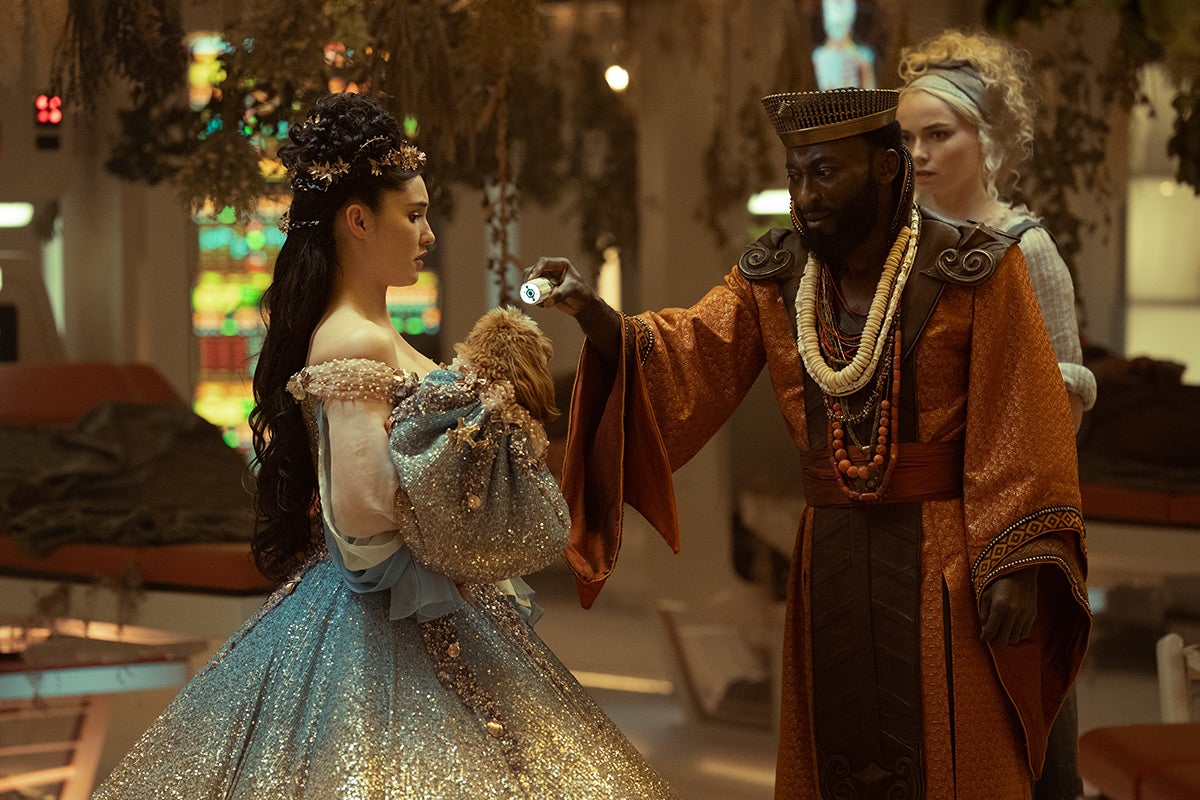
It’s delightfully silly. Playing up the fairy tale tropes, all the other bridge crew members get thrust into larger-than-life roles that their actors relish in going completely overboard with. The brave, noble Captain Pike gets turned into a cowardly, treacherous court advisor, letting Anson Mount uncharacteristically shriek and whine his way through the episode. The demure, still-unsure-of-herself Uhura fills in as the sinister Queen Nev, the villain of the piece, and Celia Rose Gooding vamps up suitably, as does Ethan Peck as Nev’s wizard ally, giving us a rare look at Spock’s darker impulses through a suitably camp and fun abstract. Christina Chong’s La’an doesn’t get too much to do, but as an excruciatingly annoying over the top princess of a rival kingdom, she owns every moment she’s on screen, going so far over the top it’s almost too much. Some roles are easy to extrapolate — Melissa Navia’s Ortegas, always the rough-and-ready scrapper of the main crew, gets to be King Ridley’s stalwart warrior guard, and Nurse Chapel becomes the mystical healer of the Sickbay. But it’s all intentionally tropey in such a way, down to the stilted performances and overwrought dialogue our heroes are forced to blurt out in their fantasy roles, that you just get to sit back, relax, and have a good old cackle at just how cheesy and the direct opposite of self-serious it all is.
But that far abstraction away from the Enterprise’s characters and emotionalities to indulge in fantasy hijinks does not rob “The Elysian Kingdom” of a surprising amount of heart. As Dr. M’Benga and Hemmer slowly work their way through what the former knows of the book’s narrative while investigating the true cause of their strange predicament, it soon becomes clear that Rukiya and her illness sit at the heart of the mystery. Torn between ensuring his daughter is safe and his commitment to stopping the crew from hurting itself in this fantasy escape, the actual story beneath “The Elysian Kingdom” and its tropey fantasy is one of a father having to let go of a daughter he loves. After M’Benga and Hemmer discover that the nebula the Enterprise was probing is in fact a spontaneously created sentient lifeform, the doctor theorizes that it is Rukiya, rather than his own recollections of the fantasy tale they read together, driving the crew’s predicament. Finding the young girl in his own quarters, it’s revealed that the entity’s psionic abilities allowed it to sense Rukiya in stasis, and decided to both cure and free her as an act of goodwill (and to share the loneliness they both felt, disembodied beings unable to communicate).
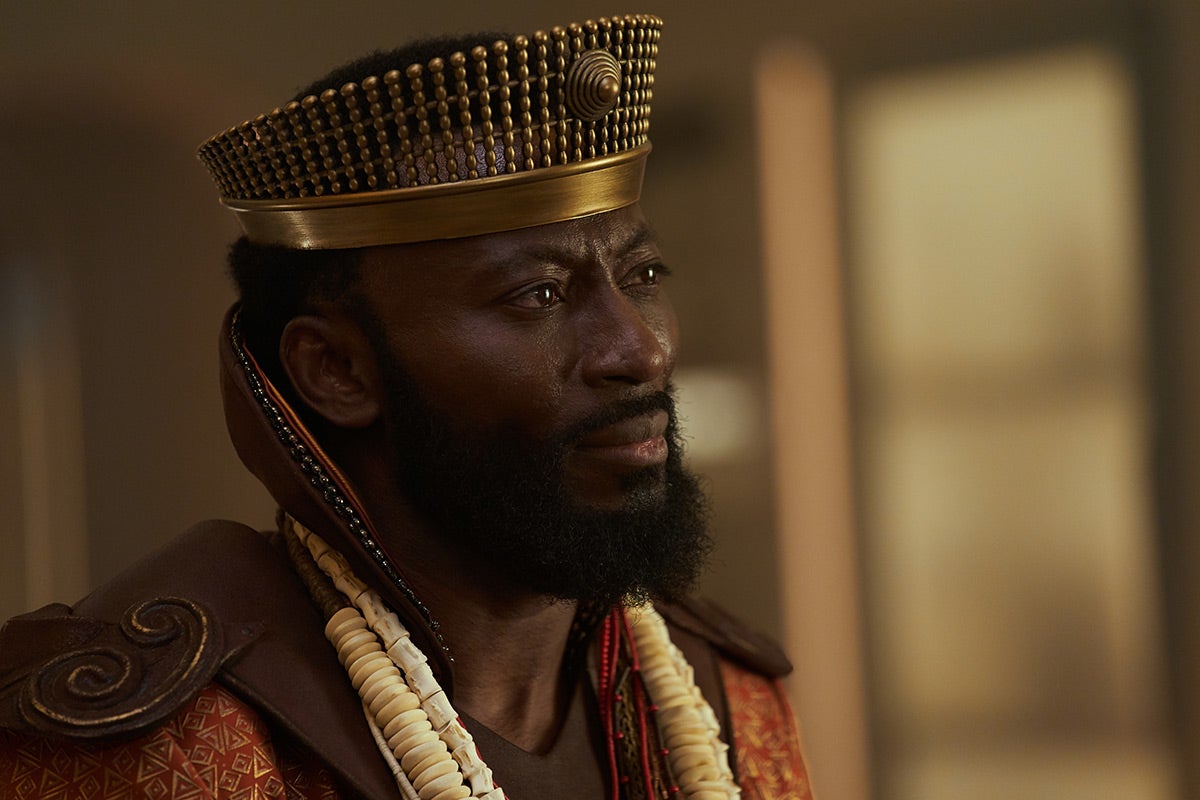
If “The Elysian Kingdom” were as predictable as either I or Dr. M’Benga himself thought it might be, it’d be at this point that the godlike cosmic entity magically uses its vast, incomprehensible abilities to right the day for everyone involved — Rukiya gets magically healed of her illness, the crew is turned back to normal, everyone’s happy to never mention any of this and go on to the next adventure. And it’d be fine to! A nice, breezy indulgence among many breezy indulgences this season. But “The Elysian Kingdom” surprises, and excels, in its final act, in giving M’Benga a terrible choice: moving the Enterprise away from the nebula will mean Rukiya will sicken again, but if he wants his daughter to remain happy and healthy, he will have to let her go, allowing her to merge with the nebula entity and exist as a new, disembodied form of consciousness. It’s a heartbreaking moment, and Olusamokun steps up to the proverbial plate to deliver what is a standout performance for the entire show so far, portraying M’Benga’s dilemma and heart with such incredible nuance.
It’s an emotion that is earned with the weight it deserves, too, as Dr. M’Benga is really one of the rare stars of the show that has been allowed to have an arc that persists here and there across Strange New Worlds’ first season, exploring his options to help his daughter. Coming to the conclusion that there can be no ideal ending — that, as hard as he tries, whether with the power of a fantastical king or the scientific mind of a brilliant physician, he has to make the decision to let his child go for her own sake — is a powerful end to that arc. But it also marks an important moment for M’Benga’s journey, to be able to see him accept both happiness for his daughter and his limitations as a doctor, and how that lesson will impact whatever Strange New Worlds will do with him next.
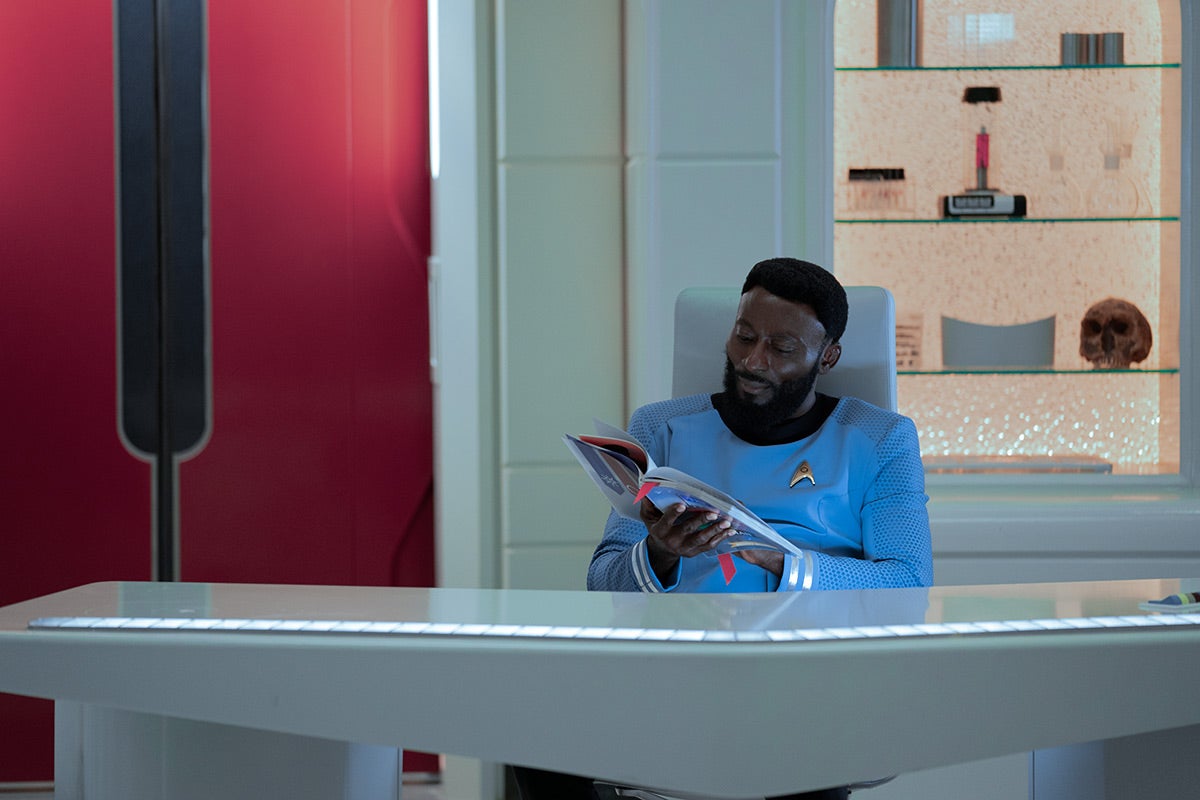
It’s good thing, in the end, that Strange New Worlds is still capable of this kind of heartful surprise, after a season that has largely stuck with the comfortable familiarity of its riffs and breeziness. That it can on the one hand take itself so seriously to deliver an emotional gut punch while on the other play itself so loosely it can devolve into a camp farce to layer over that drama is a great asset for a show as comfortable and confident as Strange New Worlds has proven itself to be this season. Hopefully it will mean that, just as Dr. M’Benga now has to, the series can find the courage and ingenuity to let go of the past a little more often itself, and find something new and similarly rewarding to challenge itself with.
Want more Gizmodo news? Check out when to expect the latest Marvel and Star Wars releases, what’s next for the DC Universe on film and TV, and everything you need to know about House of the Dragon and Lord of the Rings: The Rings of Power.
